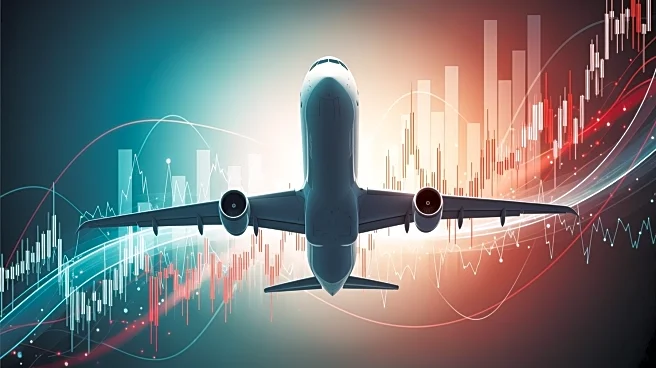What's Happening?
United Airlines has reported its third-quarter 2025 financial results, surpassing earnings expectations but falling short on revenue. The airline posted adjusted earnings per share of $2.78, exceeding
the expected $2.62. However, revenue was slightly below expectations at $15.23 billion compared to the anticipated $15.33 billion. United's net income fell 1.7% to $949 million, or $2.90 per share. The airline has been expanding its flying capacity, increasing it by 7% in the third quarter over last year. Despite challenges, United's premium-cabin revenue rose by 6%, and sales from its loyalty program increased by 9%.
Why It's Important?
United Airlines' ability to exceed earnings expectations despite revenue challenges highlights the airline's strategic focus on expanding capacity and enhancing customer experience. The airline's investments in technology, such as inflight Wi-Fi and refreshed cabins, are aimed at winning and retaining brand-loyal customers. This performance may influence investor confidence and impact market dynamics in the airline industry. United's focus on premium-cabin revenue and loyalty programs underscores its commitment to attracting affluent travelers, which could drive future growth and competitive advantage.
What's Next?
United Airlines plans to continue expanding its global network and enhancing customer experience through strategic investments. The airline's leadership, including CEO Scott Kirby, will discuss the financial results and future strategies in upcoming communications. Investors and analysts will closely monitor United's performance and strategic decisions, particularly in the context of potential economic shifts and competitive pressures. The airline's focus on capacity expansion and customer loyalty may influence its competitive stance in the industry.
Beyond the Headlines
The financial results from United Airlines may have broader implications for the airline industry, including potential shifts in investment strategies and market perceptions. The airline's success in expanding capacity and enhancing customer experience could lead to increased competition among major carriers, driving innovation and strategic partnerships. Additionally, the results may impact regulatory discussions and policy decisions, particularly in areas related to aviation safety and consumer protection.










